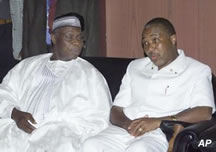
Requiem For Charles Taylor: Those Who Make History Don't Usually Write History

Requiem For Charles Taylor: Those Who Make History Don't Usually Write History
 |
The makers of history, such as ruthless dictators whose actions significantly affect the lives of others, do not usually write what society finally accepts as history. As soon as that dictator loses power (e.g., President William Tubman, 1944-1971 and President Samuel Doe, 1980-1990), the people quickly discard the lies that he and his band of unscrupulous praise-singers had recorded as history. It is only then that history (in this case the actions of the tyrant) as the masses had remembered, is subsequently written. This phenomenon explains, for instance, why all the accounts that Tubman's praise-singers wrote about his benevolence and enlightenment have been replaced with books that portrayed him as most Liberians actually saw him, i.e., an autocrat. See, for example, Tuan Wreh, "The Love of Liberty: The Rule of President William V. S. Tubman in Liberia, 1944-1971."
The history that Taylor tried to grudgingly write as his presidency collapsed
will be renounced even faster than those that Tubman and Doe attempted to
write. One reason is that the level of violence that was unleashed between
1989 (when Taylor began his so-called war of liberation) and the present,
is probably unmatched in Liberia's entire history. And Taylor is the
person that most Liberians and the international community directly blame
for this unprecedented violence. So before his disgraceful fall, the people
were already writing the history of his brutal dictatorship.
Taylor's last-ditch attempt to recast himself in a positive light is
particularly hypocritical since he squandered several momentous opportunities
to make the right history, a history that could have endeared him to Liberians.
For instance, Liberians could have remembered warlord Taylor as the "liberator"
he professed to be in 1990 had he ordered his motley bunch of killers to stop
fighting when Prince Johnson executed President Samuel Doe. Instead, the "liberator"
ordered his troops to continue the battle, determined to capture Monrovia,
the only obstacle to his presidential ambition. At the time, thousands of
civilians had sought refuge in Monrovia. Hundreds upon hundreds were summarily
executed by soldiers loyal to both Taylor and Doe. It is alleged that the
"liberator" himself carried out some of the murders. How can Liberians
ever forget Taylor's infamous justification for the murder and the pillage:
"We will spoil it and we will fix it," he ranted. Fate did give
the "liberator" an opportunity to fix it, to make history, a history
that would have been kind to him.
Elected as president, Taylor said all the right things during his inaugural
ceremony in 1998 (e.g., justice, jobs, computerized classrooms, restoration
of water and electricity). But just as some long-time Taylor watchers had
expected, the imposter continued his regime of terror, plunder and theft.
Critics were killed or routinely incarcerated. Government employees went unpaid
for months and then years. Education became a privilege as only few private
schools operated regularly. In Monrovia, the people reverted to drinking water
from wells since Taylor did not keep his promise to repair the war-damaged
hydro plant. His promises of restoring electricity and public hospitals were
never fulfilled. The entire nation lay in ruins. In the meantime, the man
who now cast himself in the same light as Jesus, the "sacrificial lamb
. . . that you may live," pillaged the nation's meager resources.
He imported a stream of luxurious cars and squandered the national revenue
on his narrow circle of thieves, family and ever-expanding ring of wives and
concubines. They flew abroad, in spite of a United Nations travel ban, spending
extravagantly while the Liberian economy, along with every social service,
decayed. All along Taylor, the self-proclaimed "sacrificial lamb,"
wallowed in opulence as his flock succumbed to poverty and disease right before
his very eyes. "I have fulfilled my duties" he told the starved
and beleaguered Liberians on the hour of his shameful departure.
The irony of the history that Taylor orchestrated on his final days is that
it looked real. First he addressed the "nation" although the rebels
were closing on him and the "nation" lay desolate as famished
citizens dodged bullets to forage for food in swamps and other unsavory places.
The charade continued the next day. He traveled to the airport to welcome
three of his presidential peers that had come to bid him farewell. Enthroned
in the Executive Mansion, surrounded by a dwindling circle of killers and
thieves, including Vice President Moses Blah, Taylor addressed the "nation"
once more and then handed the reigns of power to Blah. He immediately left
for the airport and absconded to Nigeria. The greatest paradox of this sham
is it all took place with CNN and Fox News providing international coverage
for Charles Taylor, an indicted war criminal; the world watched and his fellow
African "dignitaries" applauded.
 |
|
Charles Taylor (R) with President Obassanjo
|
